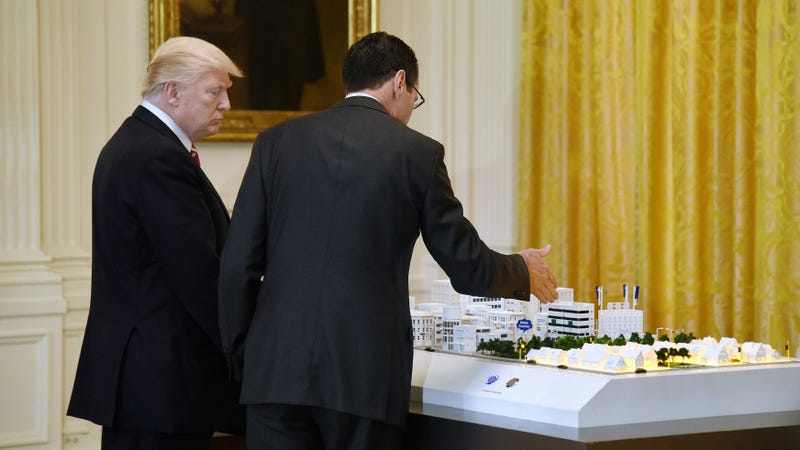 AT&T Senior Executive Randall Stephenson (R) explains to President Donald Trump how the 5G will be deployed in cities during the American Leadership in Emerging Technology Event at the White House, on June 22, 2017.Photo: Getty
AT&T Senior Executive Randall Stephenson (R) explains to President Donald Trump how the 5G will be deployed in cities during the American Leadership in Emerging Technology Event at the White House, on June 22, 2017.Photo: Getty
The Trump administration’s ambitious plan to speed up 5G deployment across the country—namely by curbing the decision-making power of local governments in its construction—is headed for its first legal hurdle. Several U.S. cities are poised to seek relief from the courts, arguing, in part, that the regulations passed by the FCC last week are burdensome, unfairly limiting the cities’ ability to recoup fees from telecom providers.
The Federal Communications Commission (FCC) voted in September to place the rollout of 5G, the next generation of wireless technology, in the hands of the federal government, stripping away the power of local officials to negotiate directly with telecoms such as AT&T over the cost and placement of 5G equipment. The effect of the change is this: Cities will take in considerably less revenue from fees charged to telecom providers for mounting wireless equipment on city property. What’s more, the amount of time local officials have to dispute where the equipment is placed has been reduced to a 60- to 90-day window.
5G connection speeds are reputed to be up to 100 times faster than the current generation of cellular service. But to accomplish this, 5G relies on high-frequency waves that cannot travel the same distance allowed by current cellular technology. To achieve 5G speeds, cities and towns will inevitably do away with the massive cell towers recognizable to most Americans and replace them thousands of smaller towers mounted primarily on utility poles throughout the city. Higher estimates place the number of new cell sites needed at roughly 100 times what’s currently in place.
However, a number of cities aren’t pleased with the FCC decision, framing it as nothing less than a financial windfall for major telecom providers. The new rules, passed on September 26, restrict cities from charging companies more than $270 per year for each piece of hardware attached to city property. In Portland, for example, that’s $2,730 less than is typically charged. (The new FCC rules also allow a one-time $500 installation fee.)
“I do not believe the law permits Washington to run roughshod over state and local authority like this…”
On Tuesday, Portland’s city council cleared the way for the city to sue the Trump administration over the new rules, casting itself as a local city protecting its right to manage its own property against a meddlesome federal agency ostensibly working on behalf of major corporations. Seattle, too, plans to appeal the FCC decision, with city officials saying the new rules impede local authorities’ ability “to serve as trustees of public property,” arguing the rules will also “increase costs and impose an unreasonable burden on local governments.”
Talks of similar suits have sprung up across Massachusetts, the Boston Globe reported Tuesday.
The counter-argument offered by proponents of the FCC rules is that local governments will impede the 5G deployment amid a global race for higher internet speeds by politicizing the process or charging telecom providers exorbitant fees. The move was praised, for example, by the Wall Street Journal editorial board, which argued that cities are likely to pit telecom companies against one another in an effort to jack up utility pole rental fees beyond what the newspaper determined are fair market rates.
In San Jose, California, the WSJ noted, rental fees accrued from utility placement is used by the city to help boost internet access in low-income neighborhoods. Los Angeles, too, has sought to balance the number of 5G permits handed out between wealthy and poorer areas—a move the newspaper painted as unnecessary and political because, it argued, “there will be sparse demand for 5G in low-income neighborhoods” over the next few years.
While the FCC rules passed unanimously, the agency’s lone Democrat, Commissioner Jessica Rosenworcel, dissented in part, saying the order amounted to a handful of unelected federal officials “telling state and local leaders all across the country what they can and cannot do in their own backyards.”
“I do not believe the law permits Washington to run roughshod over state and local authority like this,” said Rosenworcel, “and I worry the litigation that follows will only slow our 5G future.”